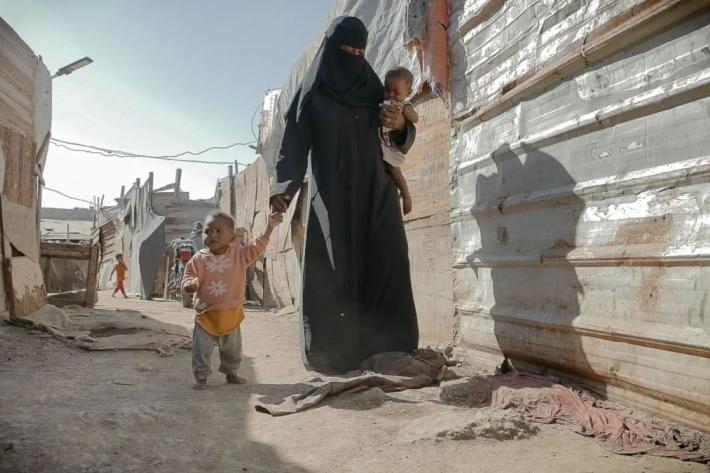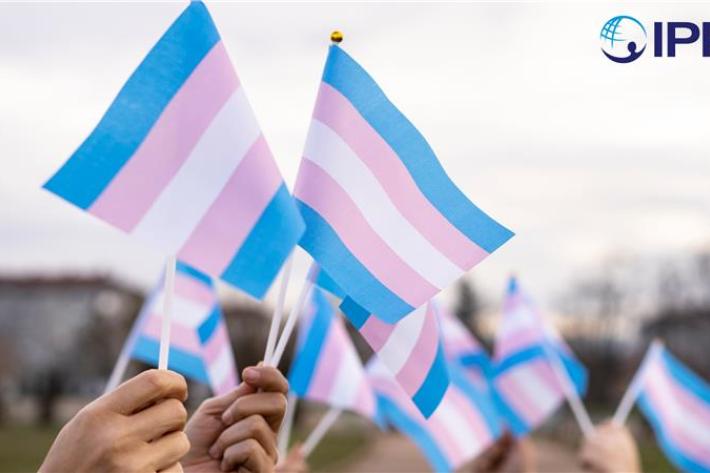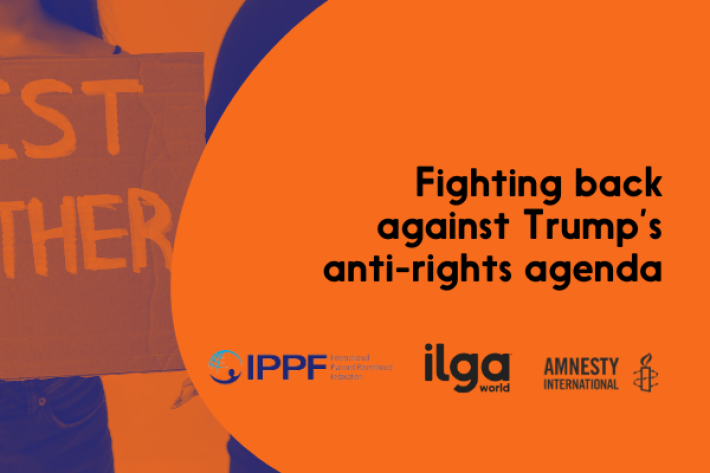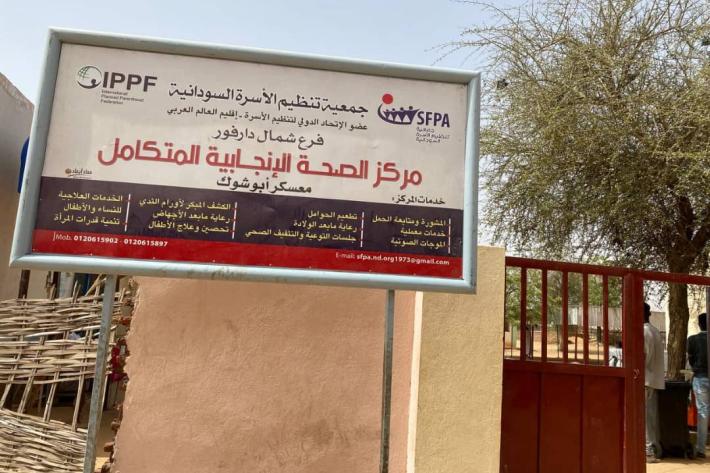
Spotlight
A selection of news from across the Federation

IPPF announces the launch of the call for applications for the post of Director General
The Director-General will play a crucial role in shaping IPPF’s strategic and operational direction, ensuring strong governance, transparency, inclusion, and collaboration.
Filter our news by:

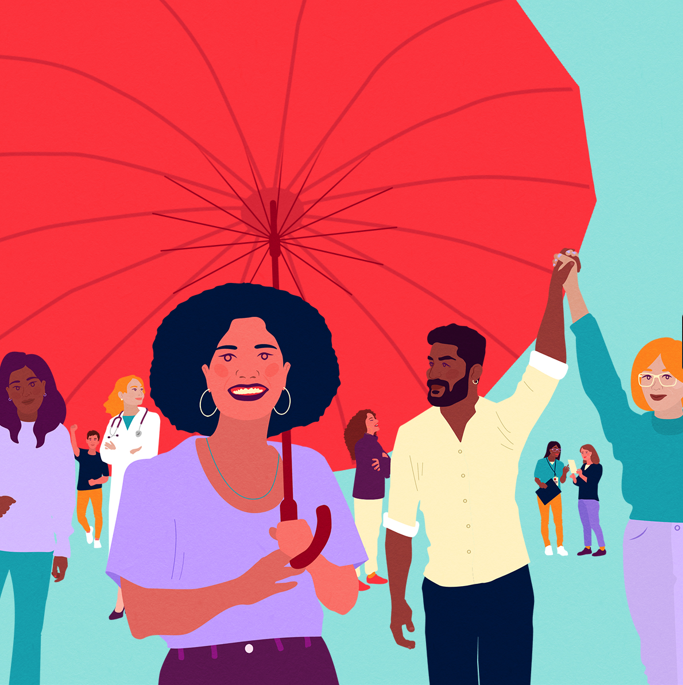
| 26 June 2024
IPPF Statement Reacting to the SR VAWG's Report on Prostitution and Violence Against women and Girls
Stigmatising. Ideologically driven. Damaging. These are just a few words that can describe this report. The International Planned Parenthood Federation is a global feminist, sexual and reproductive health and rights organisation with decades of experience providing services to sex workers’ of all genders. We denounce in the strongest terms the content of this report and the ideologically driven process that led to it. The report ignores decades of international evidence and global recommendations by WHO, UNAIDS, Amnesty International - and more importantly sex workers themselves. Sex workers' voices have deliberately been ignored in the drafting of this report, reproducing the patriarchal silencing and exclusion that sex workers face in their daily lives. At times of increasing attacks on women’s and LGBTQI communities, this report is fuelling misconceptions and harmful stigmatisation. The report promotes policies consistently proven to violate sex workers’ human rights using human rights rhetoric and erase sex workers consent, agency and humanity At a time when racialised and migrant communities are increasingly calling to end police brutality and impunity, this report only offers more criminalisation and policing - putting the lives of most marginalised sex workers at risk. The International Planned Parenthood Federation support the full decriminalisation of sex work. and stands in full solidarity with sex workers, their organisations and their struggles for human rights. There is no feminism without sex workers. Sex work is work.

| 20 June 2024
Sex workers and feminist allies welcome UN human rights experts’ support for the full decriminalization of sex work
Major progress has been made in the debate on sex workers’ rights through a recent paper, “Eliminating discrimination against sex workers and securing their human rights,” published by the United Nations (UN) Working Group on Discrimination Against Women and Girls. In advocating for the full decriminalization of sex work based on international standards for strengthening women’s bodily autonomy and sexual and reproductive health, this guidance document is an important step toward a human rights-based approach to sex work for all UN bodies to follow. Unlike the sensationalist and reductive claims made by many anti-rights groups, the Working Group’s paper is grounded in evidence-based research and informed by consultations conducted with diverse sex workers across geographical regions, including those living with HIV and those who have experienced violence, exploitation, and abuse first-hand under restrictive policy models. “The position paper is not denying the injustices that occur in sex work, but merely highlighting the criminalisation of any aspect of sex work, and other punitive laws, policies and practices, that actually create these environments of violence, risk and abuse of sex workers,” as remarked by Jules Kim, Global Coordinator of the Global Network of Sex Work Projects (NSWP) during the launch of the position paper. Furthermore, the paper draws attention to recommendations by international bodies, including several UN Special Procedure mandate holders and UN agencies, calling for the removal of punitive provisions on sex work. Given the large body of evidence and the growing consensus among international human rights bodies regarding the situation of sex workers, the Working Group concludes that there is sufficient proof of the harms of any forms of criminalisation of sex work and calls for the full decriminalization of sex work as the most conducive model to ensure the human rights of sex workers. Under decriminalization, all forms of sex work-specific criminal and licensing laws intended to sanction sex workers, clients and people who operate with sex workers are removed. The Working Group found that “in jurisdictions which criminalize sex workers, violations of their rights are numerous.” This finding is supported by international best practice guidelines and a substantial body of evidence. Decriminalization is the legal framework favoured by most sex worker-led organisations worldwide, as well as leading authorities in health and human rights. In New Zealand, following the decriminalization of sex work in 2003, sex workers have reported improved working conditions, negotiation power, and increased confidence in asserting their legal and employment rights. Sex workers in New Zealand also report improved relationships with law enforcement and an increased likelihood of reporting incidents of violence to the police. In Australia, the New South Wales (NSW) Ministry of Health has found that the reforms that decriminalized adult sex work “improved human rights; removed police corruption; netted savings for the criminal justice system; and enhanced the surveillance, health promotion, and safety of the NSW sex industry.” Contrary to early concerns, the NSW sex industry has not increased in size or visibility. Most important, the Working Group emphasises that decriminalization does not impede states’ efforts to mitigate human trafficking, citing the 2020 report of the Special Rapporteur on trafficking in persons. If anything, decriminalization assists efforts to combat trafficking and exploitation in the sex work sector. The UN Special Rapporteur on contemporary forms of slavery has recently called for the full decriminalization of sex work to prevent further human rights violations against sex workers. As the Working Group’s position paper was being drafted, NGO members of the Sex Workers Inclusive Feminist Alliance (see membership list below) and sex workers from the Global Network of Sex Work Projects (NSWP) were respondents to the consultations. Sex workers from such organizations as the Kenya Sex Workers Alliance, the European Sex Workers’ Rights Alliance, Plataforma Latinoamérica de Personas que Ejercen el Trabajo Sexual, the Guyana Vulnerable Populations Alliance and the Asia Pacific Network of Sex Workers each briefed the working group on the challenges facing their constituents. Each one briefed the Working Group on the most pressing challenges facing sex workers in their regions, including the conflation of sex work and trafficking, an increasingly strong and coordinated anti-rights and anti-gender movement and rising calls for criminalization. These calls pose a serious threat to sex workers’ rights and fly in the face of the abundant evidence of increased discrimination and isolation of sex workers in countries where sex work is criminalized. The guidance paper exemplifies meaningful inclusion of sex workers’ voices in the drafting of policy recommendations. This inclusion will lead to changes that improve the conditions of people who do sex work, particularly those most at risk of violence, poverty and poor health. The working group joins several UN agencies that have long called for the decriminalization of sex work, including the UN Population Fund, the World Health Organization, the UN Development Program and the Joint United Nations Program on HIV/AIDS (UNAIDS). Originally published in PassBlue on May 31, 2024. SWIFA was formed as part of a long-term strategy of building alliances across the sex workers’ and feminist movements to advance the acceptance of sex workers’ rights within the women’s movement. Organisations in the alliance include: Amnesty International, CREA, FEMNET, Global Alliance Against Traffic in Women (GAATW), Global Network of Sex Work Projects (NSWP), International Women’s Rights Action Watch Asia Pacific (IWRAW Asia Pacific), Women’s Global Network for Reproductive Rights (WGNRR) and the International Planned Parenthood Federation (IPPF).

| 26 March 2024
IPPF Statement on the 68th session of the Commission on the Status of Women (CSW)
IPPF welcomes the agreed conclusions of the 68th session of the Commission on the Status of Women (CSW), on the theme of “Accelerating the achievement of gender equality and the empowerment of all women and girls by addressing poverty and strengthening institutions and financing with a gender perspective”. IPPF actively engaged in the process by providing technical inputs to Member States, raising awareness about the interlinkages between SRHR, poverty, gender equality and the empowerment and human rights of all women and girls. IPPF also supported the engagement of civil society organizations (CSOs) from across the world, bringing women and girls’ real-life experiences into the conversation. This year’s priority theme provided governments with an important opportunity to find common ground and to decide on accelerated action to respond to the broad and collective challenges related to poverty affecting women and girls, in all their diversity. Although the world has experienced continuous global poverty reduction for several decades, a period of significant crises, including the global Covid-19 pandemic, the triple planetary crisis and ongoing conflicts, resulted in lost progress. Between 2020-2022, poverty increased in low-income countries, which we have not yet recovered from. Almost 700 million people live in extreme poverty today, and an additional $360 billion of investments are needed per year, in order to achieve gender equality and women’s empowerment across the Sustainable Development Goals (SDGs). Poverty is also a key contributor to numerous human rights violations. Globally, women and girls living in poverty are more likely to suffer the consequences of the climate crisis and food insecurity, as well as lack of access to health services, decent work, opportunities and protection measures from gender-based violence, harassment and abuse. Women also have less access to land, natural resources and financial assets. CSW68 was the Commission’s third in-person convening after the global Covid-19 pandemic and provided an important platform for CSOs to meet, mobilize and elaborate on successful strategies. The negotiations were led by the Ambassador of the Netherlands. Discussions were animated, and there were diverse views on topics including SRHR, human rights, and multiple and intersecting forms of discrimination (MIFD).(1) Geopolitical landscape The geopolitical backdrop to this year’s negotiations was, at times, extremely divided, with key issues such as the right to development, sexual and reproductive health and rights, comprehensive sexuality education, MIFD, family-related language, and ongoing humanitarian crises and conflicts causing political stalemate at times. Nonetheless, in the end, a consensus was reached, and Agreed Conclusions were adopted. Sexual and reproductive health and reproductive rights IPPF welcomes strong references to sexual and reproductive health (SRH), health care-services, and sexual and reproductive health and rights: in particular, preambular paragraph PP27 and operative paragraphs (ii), (kk), (ll) and (mm). The consensus reached at this year’s Commission reflects the broad-based support of Member States to take steps to address the opportunities and challenges that arise in the context of SRH and poverty, and strengthening institutions and financing with a gender perspective. Adolescents We welcome the Agreed Conclusion’s references to adolescents and girls, recognizing the need for a life course approach and their experiences of multidimensional forms of poverty. We also welcome language to promote the full, equal and meaningful participation and leadership of young women, adolescents and girls in the context of addressing poverty and strengthening institutions and gender-responsive financing. In particular, we welcome the language addressing the gender-specific barriers to their rights and empowerment, such as all forms of violence, including sexual and gender-based violence, child, early and forced marriage, and adolescent pregnancy, as well as the unequal distribution of unpaid care work. Multiple and intersecting forms of discrimination We welcome references to multiple and intersecting forms of discrimination in the text given its centrality to this year’s theme. Women, adolescents, girls, and marginalized groups experiencing MIFD are more likely to be structurally excluded and it is therefore important the Agreed Conclusions acknowledge this link with poverty eradication, and ensure gender-responsive actions and policies, including through the implementation of robust social protection measures and public services. Diversity, gender-responsiveness and human rights references We welcome the references to the diversity of situations and conditions of women and girls in the text, as well as the reference to ensure the full, equal and meaningful participation and representation of women in diverse situations and conditions in all spheres of public life and decision-making. This includes participation and representation in economic policy, budget and financial processes, public institutions, and in designing and implementing poverty eradication policies to both address institutional gender biases and promote pro-poor, economic and social policy actions that fully respect the human rights of all women and girls. We welcome strong references to the human rights and fundamental freedoms of all women and girls in the text. In this sense, we welcome the linkage between social protection systems and the fulfillment of women’s and girls’ human rights; the recognition of the challenges to the full realization of human rights of older women; the reaffirmation that human rights of women include their right to have control over and decide freely and responsibly on all matters related to their sexuality; and the need to ensure full respect for women and girls’ human rights in the digital context, to name some salient examples. Putting the Agreed Conclusions into practice Despite intensive and, at times, difficult political deliberations around key issues, the adoption of Agreed Conclusions signals the strong cross-regional support for women’s and girls’ human rights, the mandate of the Commission and its priority theme. It also reflects cross-regional support for key issues, including SRHR, human rights, and preventing, addressing and eliminating gender-based violence. The importance and success of the Agreed Conclusions lie in its implementation at the national level. IPPF and its Member Associations are well placed as a locally owned, global Federation to work to ensure the implementation of the Agreed Conclusions at national, regional, and global levels. This will ultimately and most importantly benefit the lives of women, adolescents, girls, and other marginalized groups in the communities where they live. ______ (1) Intersectionality is a term used to describe the idea that social relations involve multiple intersecting forms of discrimination. This means that a person might experience several forms of discrimination, such as sexism, racism, and ableism, all at the same time. See UNDP, “What is intersectionality? And why is it important for gender equality?” (May 27, 2023) Available at What is intersectionality? And why is it important for gender equality? | United Nations Development Programme (undp.org)
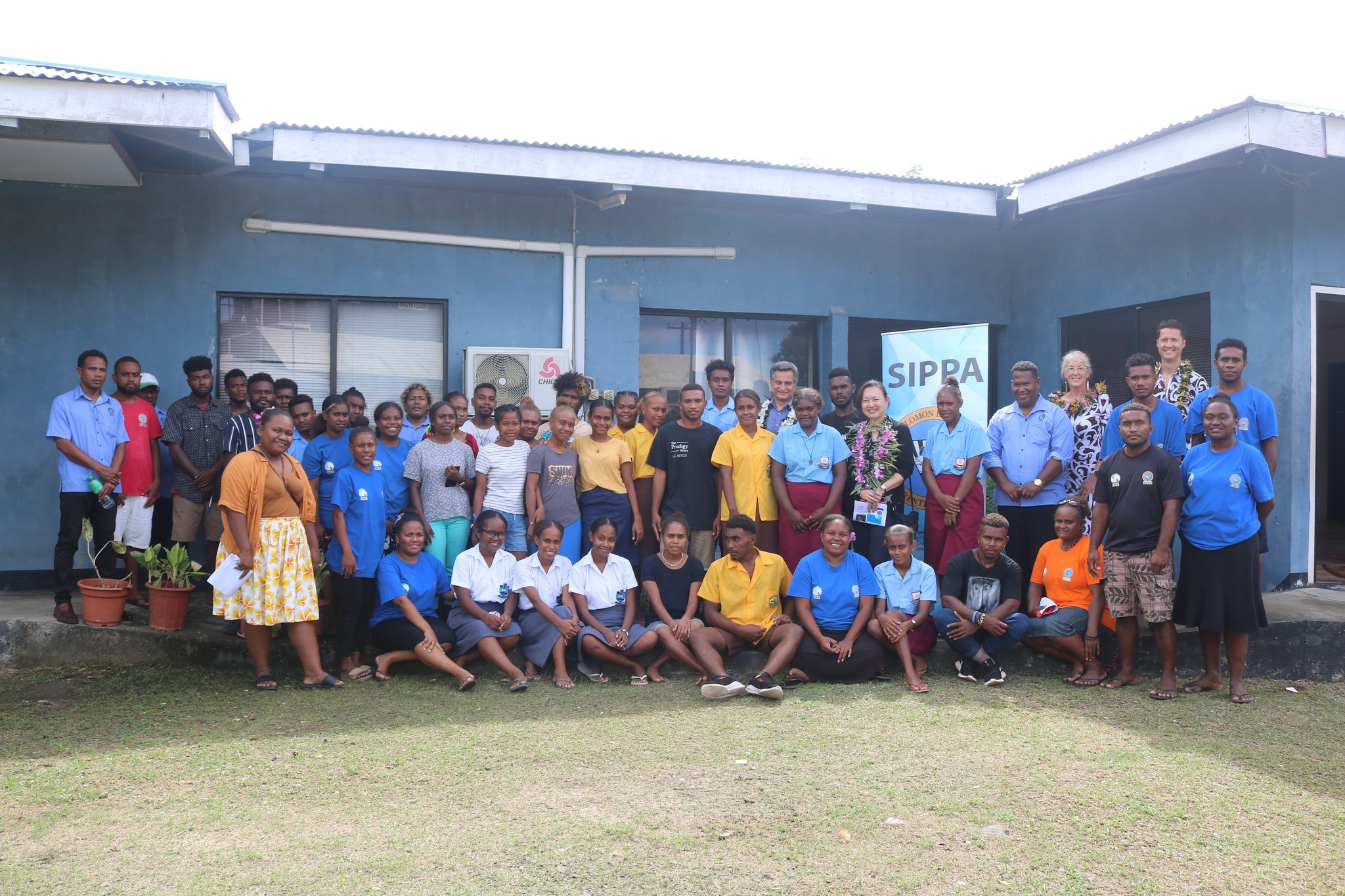
| 28 March 2023
IPPF’s Director General Visits Solomon Islands and Australia
The Director General of the International Planned Parenthood Federation (IPPF), Dr Alvaro Bermejo, is in Australia this week for high level meetings with Australian Government Ministers and the Australian Department of Foreign Affairs and Trade (DFAT). He is joined by Ms Tomoka Fukuda, Regional Director of IPPF’s East and Southeast Asia and Oceania Region (ESEAOR) and Ms Phoebe Ryan, IPPF’s Chief of the Australia and New Zealand Office. In Australia, Dr Bermejo has been privileged to meet with Australia’s Minister for International Development and the Pacific, the Hon Pat Conroy. Together, they discussed how Australia can play a leadership role in advancing sexual and reproductive health and rights through Australia’s international development cooperation.

| 10 November 2022
Sexual and reproductive justice to deliver the Nairobi commitments
Today, the International Planned Parenthood Federation (IPPF) is helping launch the second report of the High-Level Commission on the Nairobi Summit, also known as the International Conference on Population and Development 25 (ICPD 25). The Commission is an independent advisory board comprised of 26 members from different sectors tasked with monitoring progress on the ICPD Programme of Action and Nairobi Summit Commitments. The programme of action contains commitments from 179 countries to put the rights, needs and aspirations of individual human beings at the centre of sustainable development, part of which includes achieving universal access to sexual and reproductive health for all. The report - ‘Sexual and reproductive justice as the vehicle to deliver the Nairobi Summit commitments’ - highlights sexual and reproductive justice as the key to the realization of the Nairobi Summit commitments. Sexual and reproductive justice is a universal concept. It includes the right to have or not have children, the right to parent one’s children in safe and sustainable environments, and the right to sexual autonomy and gender freedom. Monitoring the implementation of life-saving sexual and reproductive health and gender-responsive services is crucial to ensure accountability and human rights for all. However, while some progress has been made, many barriers persist, and millions worldwide still do not realize their sexual and reproductive rights. Progress on Nairobi Summit Commitments: Numerous country commitments made at the Nairobi Summit align with a sexual and reproductive justice framework. They pay explicit attention to marginalized and vulnerable populations, notably people with disabilities, refugees, migrants (particularly migrant women), young people and older persons. Indigenous peoples, people of African descent and other ethnic minority groups have received less attention. A slew of new reproductive rights legislation followed the Nairobi Summit, suggesting a basis for a sexual and reproductive justice framework. The high number of commitments prioritizing sexual and gender-based violence offers a powerful entry point for promoting sexual and reproductive justice. On the Summit’s Global Commitments, some improvement is evident in meeting unmet need for family planning. But no region has registered positive movement towards zero preventable maternal deaths. Greater access to family planning has yet to translate into better maternal health outcomes. There is some progress in offering comprehensive and age-responsive information and education on sexuality and reproduction and adolescent-friendly, comprehensive, quality and timely services. Certain regions and countries have advanced in providing timely, quality and disaggregated data. More must be done, but this creates opportunities for ensuring that data capture intersecting challenges and are used to inform laws, policies and programmes. Domestic and international finance is critical to sexual and reproductive justice but persistently lags commitments. More than 4 billion people globally will lack access to at least one key sexual and reproductive health service during their lives Dr Alvaro Bermejo, Director-General for the International Planned Parenthood Federation, said:
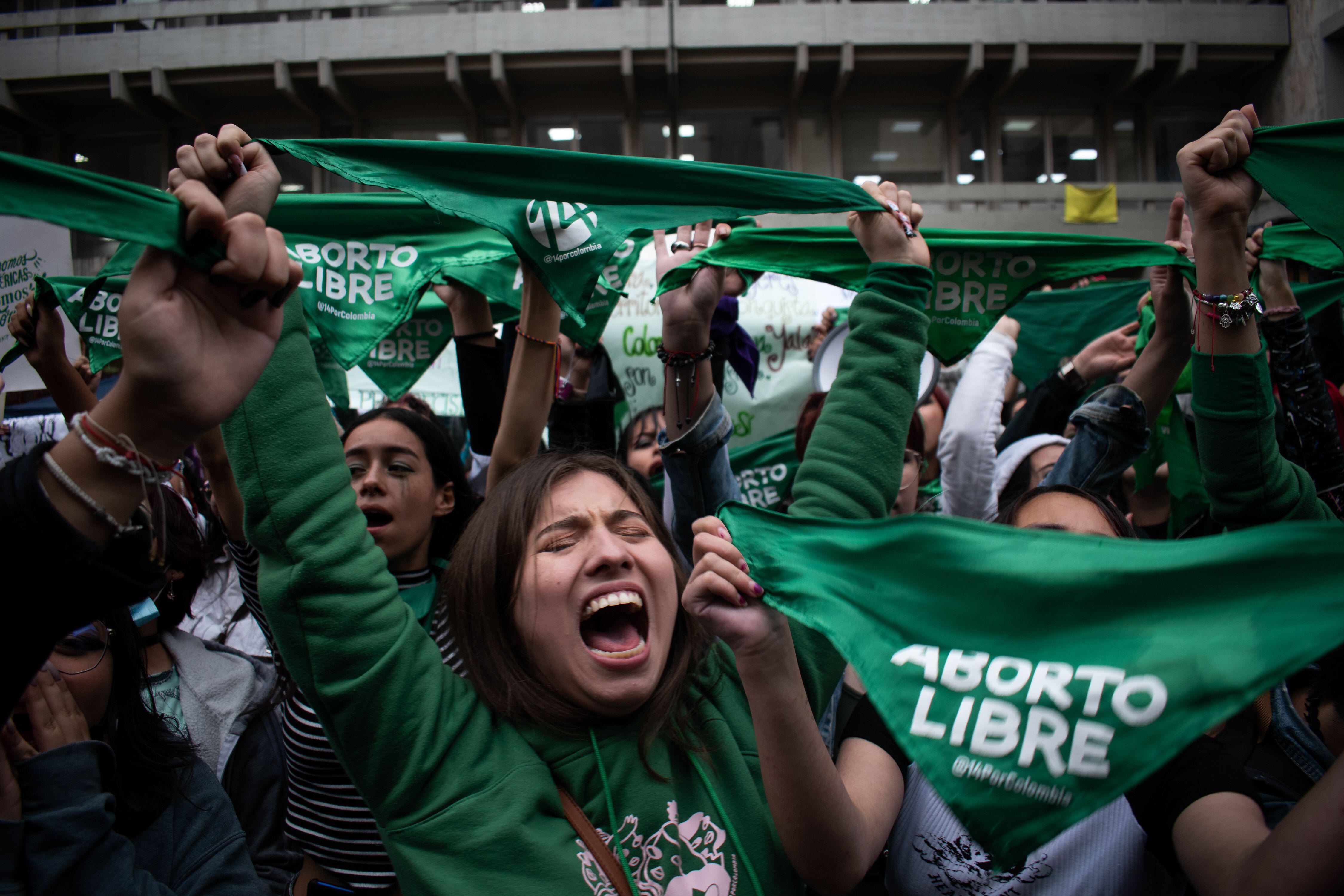
| 22 February 2022
Colombia decriminalizes abortion
The Colombian Constitutional Court has decriminalized abortion up to 24 weeks in another victory for the Green Wave sweeping through Latin America. The historic decision follows years of campaigning by women's right's activists across Colombia and came off the back of two lawsuits that asked the court to declare article 122 of the penal code, that "the woman who causes her abortion or allows another to cause it, will incur a prison sentence from sixteen (16) to fifty-four (54) months" as unconstitutional. Having delayed several times over the past two years, the court called an extraordinary meeting on Monday 21st February 2022, and took just a few hours to come to its decision - ruling five against four to decriminalize the healthcare procedure. The decision will go into effect immediately. ProFamilia, IPPF's Member Association in Colombia, and Colombia's largest provider of legal abortion care was heavily involved in pushing to extend the rights of those needing to access abortion care. Colombia follows other countries in the region such as Mexico and Argentina, while parliamentarians in Ecuador last week eased regulations to allow access to abortion in cases of rape. Marta Royo, Executive Director for Profamilia, IPPF's Member Association in Colombia, said: "Today is a ground-breaking moment for the people of Colombia and a long-overdue guarantee of reproductive rights and dignity for all those who need abortion care, especially poor and rural women who bear the brunt of restrictive abortion policies. "The decriminalization of abortion up to 24 weeks in Colombia and the Green Wave movement across Latin America is centred not just on public health, but also the full lives, citizenship and human rights of girls, adolescents, and women – who, for multiple reasons, including inequity, access to education, gender-based violence and barriers to healthcare – continue to face unintended pregnancies. "The freedom for women to finally make their own choices about their pregnancies and their bodies is fundamental to disrupting the cycle of poverty that so many in Colombia face. This monumental decision is also a win for the dedicated health care providers, who will finally be recognized as people who simply care about the needs of others." While Colombian women have supposedly been able to access abortion care since 2006 under three circumstances: if their life or health is at risk, in cases of fatal foetal abnormalities, or if the pregnancy is the by-product of rape or incest, in reality, the criminalization of abortion persisted. The Guttmacher Institute found that less than one per cent of the estimated 400,000 abortions carried out each year in Colombia are performed legally, with women, especially poor, rural, vulnerable and marginalized women, facing significant barriers to accessing safe and timely abortion care. Many Colombian women are instead forced to carry their pregnancies to term or else seek other methods to end them. Figures collected by ProFamilia showed that during 2020, there were at least 26,223 unsafe abortions across Colombia, a startling amount for which consequences range from infection to life-changing injuries to death. As per the previous abortion law, other women have been imprisoned for up to four and a half years for having an abortion, even in cases where abortion should have been legal. In a shocking example of discrimination, data collected showed that poor rural women were more likely to be charged, with a third of those who faced charges also survivors of sexual violence. Eugenia Lopez Uribe, IPPF's Regional Director for Americas and the Caribbean Region, said: "Today Colombia took another step in the right direction for gender equality and full human rights for all, and we are incredibly proud of IPPF's Member Association, ProFamilia, for their tireless work alongside thousands of activists across Colombia and Latin America "This 24-week decriminalization is historic in the region and especially remarkable when we consider the current fragility of abortion rights globally and the anti-choice movements which continue to plague nations across the world, including in countries close to home like the United States of America. "While today we are celebrating this historic decision, the Green Wave is strong and growing, and the fight for reproductive rights and justice will not end until every person can access high-quality sexual and reproductive healthcare when and where they need it."









